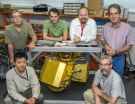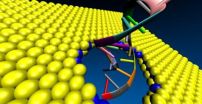(Press-News.org) Retinoic acid is a form of vitamin A that is used to treat and help prevent the recurrence of a variety of cancers, but for some patients the drug is not effective. The reason for this resistance was unclear until this week when researchers from Virginia Commonwealth University (VCU) Massey Cancer Center demonstrated that a protein known as AEG-1 blocks the effects of retinoic acid in leukemia and liver cancer. Because AEG-1 is overexpressed in nearly every cancer, these findings could impact the care of countless cancer patients.
Details of the study were published this week in the online edition of the journal Cancer Research, a journal of the American Association for Cancer Research. The team of scientists led by Devanand Sarkar, M.B.B.S., Ph.D., demonstrated that the protein AEG-1 binds to retinoid X receptors (RXR), which help regulate cell growth and development. RXR is typically activated by retinoic acid, but the overexpressed AEG-1 proteins found in cancer cells block these signals and help promote tumor growth. Using complex animal models, the researchers showed that blocking the production of AEG-1 allowed retinoic acid to profoundly kill liver cancer cells.
"Our findings are the first to show that AEG-1 interacts with the retinoid X receptor," says Sarkar, Harrison Scholar at VCU Massey Cancer Center, Blick Scholar and associate professor in the Department of Human and Molecular Genetics and member of the VCU Institute of Molecular Medicine (VIMM) at VCU School of Medicine. "This research has immediate clinical relevance such that physicians could begin screening cancer patients for AEG-1 expression levels in order to determine whether retinoic acid should be prescribed."
Sarkar and his colleagues have been studying AEG-1 for years. They were the first to create a mouse model demonstrating the role of AEG-1 in liver cancer, and they have been actively working to develop targeted therapies that block AEG-1 production. The present study expanded their knowledge of the molecular interactions of AEG-1.
"We are continuing to test combination therapies involving AEG-1 inhibition and retinoic acid in animal models, and the initial results are promising," says Sarkar. "If we continue to see these results in more complex experiments, we hope to eventually propose a phase 1 clinical trial in patients with liver cancer."
INFORMATION:
Sarkar collaborated on this study with Paul B. Fisher, M.Ph., Ph.D., Thelma Newmeyer Corman Endowed Chair in Cancer Research and co-leader of the Cancer Molecular Genetics research program at Massey, chairman of the Department of Human and Molecular Genetics at VCU School of Medicine and director of the VIMM; Jolene Windle, Ph.D., professor in the Department of Human and Molecular Genetics at the VCU School of Medicine and Irene Shaw Grigg Distinguished Professor in Genetics Research, co-leader of the Cancer Molecular Genetics research program and resource director of the Transgenic/Knock-out Mouse Facility at Massey; Luni Emdad, M.B.B.S., Ph.D., member of the Cancer Molecular Genetics research program at Massey and assistant professor in the Department of Human and Molecular Genetics at the VCU School of Medicine; Jyoti Srivastava, Ph.D., Chadia L. Robertson, Devaraja Rajasekaran, Ph.D., Rachel Gredler and Ayesha Siddiq, Ph.D., all from the Department of Human and Molecular Genetics at the VCU School of Medicine; Shobha Ghosh, Ph.D., associate chair for research in the Department of Internal Medicine at the VCU School of Medicine; Phillip B. Hylemon, Ph.D., member of the Cancer Cell Signaling research program at Massey and professor of microbiology and immunology at the VCU School of Medicine; Gregorio Gil, Ph.D., professor of biochemistry and molecular biology at the VCU School of Medicine; and Khalid Shah, Ph.D., and Deepak Bhere, Ph.D., from Harvard Medical School.
This study was supported by National Cancer Institute grant R01 CA 138540; National Institutes of Health grant R01 CA134721; the James S. McDonnel Foundation; and, in part, by VCU Massey Cancer Center's NIH-NCI Cancer Center Support Grant P30 CA016059.
News directors: Broadcast access to VCU Massey Cancer Center experts is available through VideoLink ReadyCam. ReadyCam transmits video and audio via fiber optics through a system that is routed to your newsroom. To schedule a live or taped interview, contact Alaina Schneider, (804) 628-4578.
About VCU Massey Cancer Center
VCU Massey Cancer Center is one of only 68 National Cancer Institute-designated institutions in the country that leads and shapes America's cancer research efforts. Working with all kinds of cancers, Massey conducts basic science, translational and clinical cancer research, provides state-of-the-art treatments and clinical trials, and promotes cancer prevention and education. Since 1974, Massey has served as an internationally recognized center of excellence. It offers one of the largest selections of cancer clinical trials in Virginia and serves patients at multiple sites throughout the state. Its 1,000-plus researchers, clinicians and staff members are dedicated to improving the quality of human life by developing and delivering effective means to prevent, control and ultimately cure cancer. Visit Massey online at massey.vcu.edu or call 877-4-MASSEY for more information.
About VCU and the VCU Medical Center
Virginia Commonwealth University is a major, urban public research university with national and international rankings in sponsored research. Located in downtown Richmond, VCU enrolls more than 31,000 students in 222 degree and certificate programs in the arts, sciences and humanities. Sixty-six of the programs are unique in Virginia, many of them crossing the disciplines of VCU's 13 schools and one college. MCV Hospitals and the health sciences schools of Virginia Commonwealth University compose the VCU Medical Center, one of the nation's leading academic medical centers. For more, see http://www.vcu.edu.
Protein found to block benefits of vitamin A cancer therapy
2014-08-14
ELSE PRESS RELEASES FROM THIS DATE:
Lionfish characteristics make them more 'terminator' than predator
2014-08-14
SACRAMENTO, Calif. – New research on the predatory nature of red lionfish, the invasive Pacific Ocean species that is decimating native fish populations in parts of the Caribbean Sea and Atlantic Ocean, seems to indicate that lionfish are not just a predator, but more like the "terminator" of movie fame.
The finding of behavior that was called "alarming" was presented today by Kurt Ingeman, a researcher from Oregon State University, at the annual meeting of the Ecological Society of America.
Most native predatory fish are attracted to prey when their numbers are high, ...
NSAIDs may lower breast cancer recurrence rate in overweight and obese women
2014-08-14
PHILADELPHIA — Recurrence of hormone-related breast cancer was cut by half in overweight and obese women who regularly used aspirin or other nonsteroidal anti-inflammatory drugs (NSAIDs), according to data published in Cancer Research, a journal of the American Association for Cancer Research.
"Our studies suggest that limiting inflammatory signaling may be an effective, less toxic approach to altering the cancer-promoting effects of obesity and improving patient response to hormone therapy," said Linda A. deGraffenried, PhD, associate professor of nutritional sciences ...
Mayo Clinic challenges some recommendations in updated cholesterol treatment guideline
2014-08-14
A Mayo Clinic task force challenges some recommendations in the updated guideline for cholesterol treatment unveiled by the American College of Cardiology (ACC) and American Heart Association (AHA) in 2013. The task force concludes, based on current evidence, that not all patients encouraged to take cholesterol-lowering medications, such as statins, may benefit from them and that the guideline missed some important conditions that might benefit from medication.
Furthermore, the task force believes an emphasis needs to be placed on an individualized treatment approach ...
NSAIDs benefit overweight breast cancer patients, study finds
2014-08-14
AUSTIN, Texas — Researchers have determined that postmenopausal overweight or obese breast cancer patients receiving hormone therapy as part of their treatment and who use nonsteroidal anti-inflammatory drugs (NSAIDs) such as aspirin or ibuprofen have significantly lower breast cancer recurrence rates and a sizable delay in time to cancer recurrence.
The findings, published in the Aug. 14 edition of Cancer Research, suggest a new possibility for reducing the incidence of breast cancer recurrence among overweight and obese postmenopausal women, who have a comparatively ...
Scientists make major breakthrough in understanding leukemia
2014-08-14
Scientists from Queen Mary University of London (QMUL) have discovered mutations in genes that lead to childhood leukaemia of the acute lymphoblastic type – the most common childhood cancer in the world.
The study was conducted amongst children with Down's syndrome – who are 20-50 times more prone to childhood leukaemias than other children – and involved analysing the DNA sequence of patients at different stages of leukaemia.
The researchers uncovered that two key genes (called RAS and JAK) can mutate to turn normal blood cells into cancer cells. However, these ...
Can our computers continue to get smaller and more powerful?
2014-08-13
From their origins in the 1940s as sequestered, room-sized machines designed for military and scientific use, computers have made a rapid march into the mainstream, radically transforming industry, commerce, entertainment and governance while shrinking to become ubiquitous handheld portals to the world.
This progress has been driven by the industry's ability to continually innovate techniques for packing increasing amounts of computational circuitry into smaller and denser microchips. But with miniature computer processors now containing millions of closely-packed transistor ...
UT Arlington team's work could lead to earlier diagnosis, treatment of mental diseases
2014-08-13
A computer science and engineering associate professor and her doctoral student graduate are using a genetic computer network inference model that eventually could predict whether a person will suffer from bipolar disorder, schizophrenia or another mental illness.
The findings are detailed in the paper "Inference of SNP-Gene Regulatory Networks by Integrating Gene Expressions and Genetic Perturbations," which was published in the June edition of Biomed Research International. The principal investigators were Jean Gao, an associate professor of computer science and engineering, ...
Three radars are better than one: Field campaign demonstrates two new instruments
2014-08-13
Putting three radars on a plane to measure rainfall may seem like overkill. But for the Integrated Precipitation and Hydrology Experiment field campaign in North Carolina recently, more definitely was better.
The three instruments, developed by the High Altitude Radar group at NASA's Goddard Space Flight Center in Greenbelt, Maryland, flew as part of the Global Precipitation Measurement (GPM) mission's six-week ground-validation program that took place May 1 through June 15 in the southern Appalachians, specifically to measure rain in difficult-to-forecast mountain regions. ...
New material could enhance fast and accurate DNA sequencing
2014-08-13
CHAMPAIGN, Ill. — Gene-based personalized medicine has many possibilities for diagnosis and targeted therapy, but one big bottleneck: the expensive and time-consuming DNA-sequencing process.
Now, researchers at the University of Illinois at Urbana-Champaign have found that nanopores in the material molybdenum disulfide (MoS2) could sequence DNA more accurately, quickly and inexpensively than anything yet available.
"One of the big areas in science is to sequence the human genome for under $1,000, the 'genome-at-home,'" said Narayana Aluru, a professor of mechanical ...
Patent examiners more likely to approve marginal inventions when pressed for time
2014-08-13
CHAMPAIGN, Ill. — Haste makes waste, as the old saying goes. And according to research from a University of Illinois expert in patent law, the same adage could be applied to the U.S. Patent and Trademark Office, where high-ranking examiners have a tendency to rubber-stamp patents of questionable merit due to time constraints.
The less time patent examiners are given to review an application, the more likely they are to grant patent protection to inventions "on the margin," says a study co-authored by Melissa Wasserman, the Richard and Anne Stockton Faculty Scholar and ...






